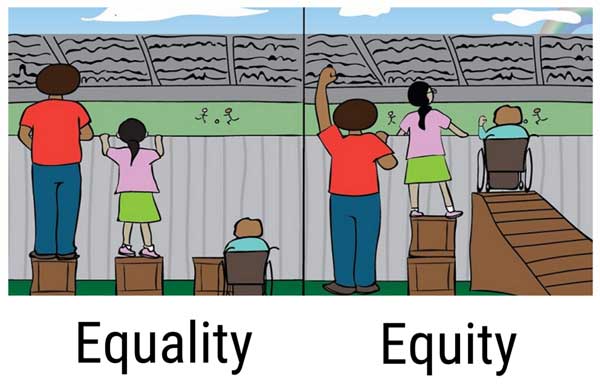Equity is not just a new word for equality. Equity ensures that all have equal opportunities in ways that work for them. Advocating for equity recognises that not everyone starts from the same position.
Why is equity important?
One of the most noticeable issues in the management of arthritis is the inequities around gout arthritis.
Gout arthritis is a significant health issue for Māori and Pacific communities. It can be managed, and people can continue to be active community members. Many people think that lifestyle factors cause gout arthritis, but it is a genetically linked condition.

Māori and Pacific are more likely to develop gout arthritis because of their genetic makeup rather than lifestyle factors.
These genetic factors are often not recognised and are poorly understood, meaning that Māori and Pacific are not receiving equitable treatment in the health system.
To meet our Mission, which is ‘improving the life of every person affected by arthritis’, we must be advocates for equity, so all can manage conditions such as gout arthritis.
Advocating for equity also means improving access to support in managing osteoarthritis and inflammatory arthritis for people who find it difficult to access current health services, and often that group will be Māori and Pacific.
Gout arthritis in Māori and Pacific communities is an issue that requires us to look at different ways of delivering messages and service delivery, such as Whānau Ora, that embrace a holistic perspective of Māori and Pacific communities.
This approach requires an appreciation that health care is intrinsically linked to broader social determinants, including housing, employment, self-determination, and transport. Accurate equity will reflect progress in health and these other indicators. This approach means partnering with other providers, recognising that such partnerships will require strong trust in messaging and service delivery by all partners.
A commitment to equity also requires a commitment to Te Tiriti o Waitangi as the foundation of a bicultural country. While Arthritis New Zealand has this commitment in our strategic priorities, our challenge is to make this commitment meaningful in all aspects of our organisation – from governance to setting priorities to developing services and our role as advocates.
This challenge is one we best meet by learning and working together, knowing that our organisation will evolve and grow as we do so.
To be serious about helping everyone, we recognise that some groups experience more barriers in accessing help and support than others.
Why is gout arthritis a core condition for our focus on equity?
• Over 200,000 people had gout arthritis in 2019, which is increasing. It is the second most prevalent form of arthritis in this country.
• Māori and Pacific have rates above the national prevalence because of their genetic predisposition to be affected by gout arthritis.
• Young Māori men, in particular, have greater difficulties in accessing care for gout arthritis.
• One in 5 people with gout arthritis lives in the areas that experience greater disadvantages or challenges in New Zealand.
This article was first published in Joint Support magazine, May 2022 issue. If you would like to receive a digital copy of Joint Support magazine, sign up below.